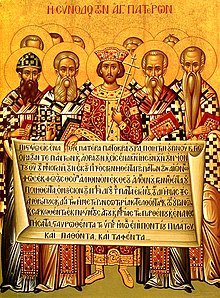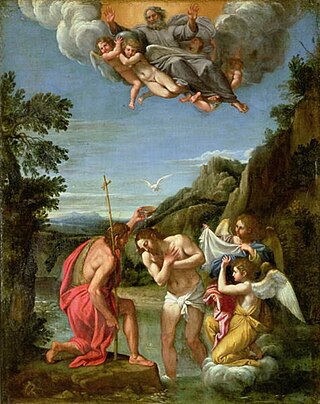
Adoptionism, also called dynamic monarchianism, is an early Christian nontrinitarian theological doctrine, subsequently revived in various forms, which holds that Jesus was adopted as the Son of God at his baptism, his resurrection, or his ascension. How common adoptionist views were among early Christians is debated, but it appears to have been most popular in the first, second, and third centuries. Some scholars see adoptionism as the belief of the earliest followers of Jesus, based on the epistles of Paul and other early literature. However, adoptionist views sharply declined in prominence in the fourth and fifth centuries, as Church leaders condemned it as a heresy.
Unitarianism is a Nontrinitarian branch of Christianity. Unitarian Christians affirm the unitary nature of God as the singular and unique creator of the universe, believe that Jesus Christ was inspired by God in his moral teachings and that he is the savior of humankind, but he is not equal to God himself.

Ebionites as a term refers to a Jewish Christian sect, which viewed poverty as a blessing, that existed during the early centuries of the Common Era. The Ebionites embraced an adoptionist Christology, thus understanding Jesus of Nazareth as a mere man who, by virtue of his righteousness in following the Law of Moses, was chosen by God to be the Messiah. A majority of the Ebionites rejected as heresies the orthodox Christian beliefs in Jesus' divinity, virgin birth and substitutionary atonement; and therefore maintained that Jesus was born the natural son of Joseph and Mary, sought to abolish animal sacrifices by prophetic proclamation, and died as a martyr in order to move all Israel to repentance.

Lelio Francesco Maria Sozzini, or simply Lelio Sozzini, was an Italian Renaissance humanist and theologian, and, alongside his nephew Fausto Sozzini, founder of the Nontrinitarian Christian belief system known as Socinianism. His doctrine was developed among the Polish Brethren in the Polish Reformed Church between the 16th and 17th centuries, and embraced by the Unitarian Church of Transylvania during the same period.
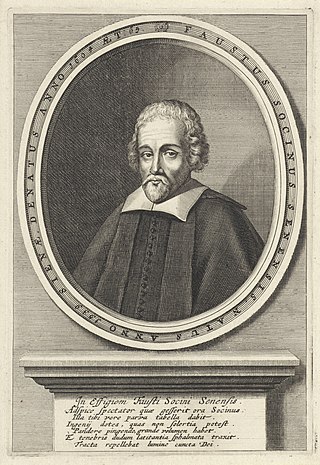
Socinianism is a Nontrinitarian Christian belief system developed and co-founded during the Protestant Reformation by the Italian Renaissance humanists and theologians Lelio Sozzini and Fausto Sozzini, uncle and nephew, respectively.
The Polish Brethren were members of the Minor Reformed Church of Poland, a Nontrinitarian Protestant church that existed in Poland from 1565 to 1658. By those on the outside, they were called "Arians" or "Socinians", but themselves preferred simply to be called "Brethren" or "Christians", and, after their expulsion from Poland, "Unitarians".
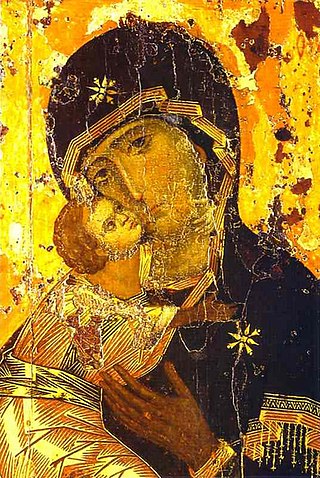
The perpetual virginity of Mary is a Christian doctrine that Mary, the mother of Jesus, was a virgin "before, during and after" the birth of Christ. In Western Christianity, the Catholic Church adheres to the doctrine, as do some Lutherans, Anglicans, Reformed, and other Protestants. The Oriental Orthodox Churches also adhere to this doctrine as part of their ongoing tradition, and Eastern Orthodox churches recognize Mary as Aeiparthenos, meaning "ever-virgin". It is one of the four Marian dogmas of the Catholic Church. Most modern nonconformist Protestants reject the doctrine.

Fausto Paolo Sozzini, or simply Fausto Sozzini, was an Italian Renaissance humanist and theologian, and, alongside his uncle Lelio Sozzini, founder of the Nontrinitarian Christian belief system known as Socinianism. His doctrine was developed among the Polish Brethren in the Polish Reformed Church between the 16th and 17th centuries, and embraced by the Unitarian Church of Transylvania during the same period.

Ferenc Dávid was a Protestant preacher and theologian from Transylvania, the founder of the Unitarian Church of Transylvania, and the leading figure of the Nontrinitarian Christian movements during the Protestant Reformation. He disputed the mainstream Christian doctrine of the Trinity, believing God to be one and indivisible.
The Racovian Catechism is a nontrinitarian statement of faith from the 16th century. The title Racovian comes from the publishers, the Polish Brethren, who had founded a sizeable town in Raków, Kielce County, where the Racovian Academy and printing press was founded by Jakub Sienieński in 1602.

The moral influence or moral example theory of atonement, developed or most notably propagated by Abelard (1079–1142), is an alternative to Anselm's satisfaction theory of atonement. Abelard focused on changing man's perception of God as not offended, harsh, and judgmental, but as loving. According to Abelard, "Jesus died as the demonstration of God's love," a demonstration which can change the hearts and minds of the sinners, turning them back to God.

In Christian theology, the doctrine of incarnation teaches that the pre-existent divine person of Jesus Christ, God the Son, the second person of the Trinity, and the eternally begotten Logos, took upon human nature and "was made flesh" by being conceived in the womb of a woman, the Virgin Mary, also known as the Theotokos. The doctrine of the incarnation then entails that Jesus was at the same time both fully God and fully human.
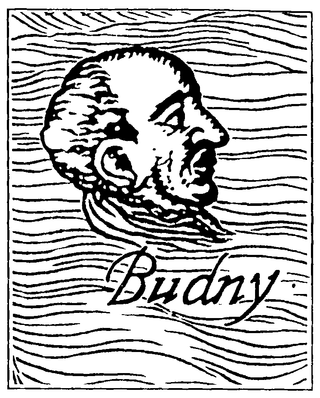
Szymon Budny or Symon Budny was a Polish-Belarusian humanist, educator, Hebraist, Bible translator, Protestant reformer, philosopher, sociologist and historian, active in the territory of the Polish–Lithuanian Commonwealth. He was one of the first to promote the development of Belarusian culture in the Belarusian language. He was one of the leaders of the Polish Brethren.
Biblical unitarianism is a Unitarian Christian denomination whose adherents affirm the Bible as their sole authority, and from it base their beliefs that God the Father is one singular being, and that Jesus Christ is God's son but not divine. The term "biblical Unitarianism" is connected first with Robert Spears and Samuel Sharpe of the Christian Life magazine in the 1880s. It is a neologism that gained increasing currency in nontrinitarian literature during the 20th century as the Unitarian churches moved away from mainstream church traditions and, in some instances in the United States, towards merger with Universalism. It has been used since the late 19th century by conservative Christian Unitarians, and sometimes by historians, to refer to scripture-fundamentalist Unitarians of the 16th–18th centuries.
Martin Czechowic (c.1532–1613) was a Polish Socinian (Unitarian) minister, Protestant reformer, theologian and writer.
Unitarianism, as a Christian denominational family of churches, was first defined in Poland-Lithuania and Transylvania in the late 16th century. It was then further developed in England and America until the early 19th century, although theological ancestors are to be found as far back as the early days of Christianity. It matured and reached its classical form in the middle 19th century. Later historical development has been diverse in different countries.

The pre-existence of Christ asserts the existence of Christ prior to his incarnation as Jesus. One of the relevant Bible passages is John 1:1–18 where, in the Trinitarian interpretation, Christ is identified with a pre-existent divine hypostasis called the Logos. There are nontrinitarian views that question the aspect of personal pre-existence, the aspect of divinity, or both.
Grzegorz Paweł z Brzezin (1525–1591), was a Socinian (Unitarian) writer and theologian, one of the principal creators and propagators of radical wing of the Polish Brethren, and author of several of the first theological works in Polish, which helped to the development of literary Polish.
Piotr Stoiński Jr. (1565-1605) was a Polish Socinian Unitarian writer.
Summa Universae Theologiae Christianae secundum Unitarios is a statement of faith of the Unitarian Church of Transylvania officially recognised by Joseph II in 1782.
